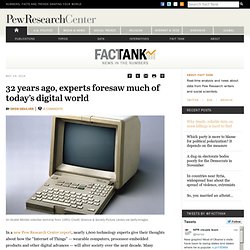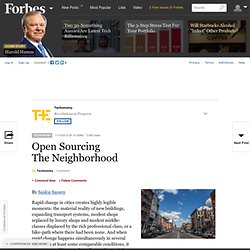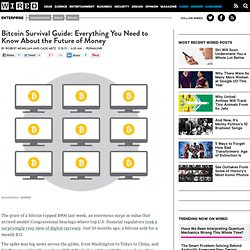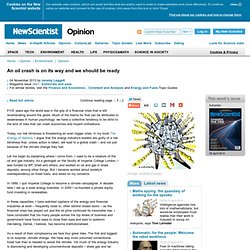

32 years ago, experts foresaw much of today’s digital world. In a new Pew Research Center report, nearly 1,600 technology experts give their thoughts about how the “Internet of Things” — wearable computers, processor-embedded products and other digital advances — will alter society over the next decade.

Many (though not all) of the experts foresee, in the words of the report, “a global, immersive, ambient networked computing environment” that will change the way we do everything from stocking our fridges to finding our soulmates. Such predictive exercises have a long history, going back at least to H.G. Wells at the beginning of the 20th century. Sentient code: An inside look at Stephen Wolfram's utterly new, insanely ambitious computational paradigm. In 2002 Stephen Wolfram released A New Kind of Science and immediately unleashed a firestorm of wonder, controversy, and criticism as the British-born scientist, programmer, and entrepreneur overturned conventional ideas on how to pursue knowledge.

Earlier this month, he teased something with the capacity to create as much passion — and, likely, much more actual change — in the world of programming, computation, and applications. Today, Wolfram gave me a glimpse under the hood in an hour-long conversation. And I have to say, what I saw was amazing. Whether you think his 1,300-page tome on the future of scientific exploration is seminal or fanciful, you can’t question that the man is a genius. Welcome to Forbes. By Saskia Sassen Rapid change in cities creates highly legible moments: the material reality of new buildings, expanding transport systems, modest shops replaced by luxury shops and modest middle-classes displaced by the rich professional class, or a bike-path where there had been none.

And when rapid change happens simultaneously in several cities with at least some comparable conditions, it makes it possible to see how diverse the spatial outcomes can be in spite of similar underlying dynamics, such as the rise of mega-structures or of one-way streets. It’s important to appreciate the incompleteness of cities—that they can constantly be remade, for better or for worse, and that they are re-made on their own terms even when the technologies used are similar. Incompleteness and mutability has allowed many of the world’s great cities to outlast kingdoms, empires, nation-states, and powerful firms.
An open-source urbanism is an antidote. Saskia Sassen is the Robert S. Bitcoin Survival Guide: Everything You Need to Know About the Future of Money. Illustration: WIRED The price of a bitcoin topped $900 last week, an enormous surge in value that arrived amidst Congressional hearings where top U.S. financial regulators took a surprisingly rosy view of digital currency.

Just 10 months ago, a bitcoin sold for a measly $13. The spike was big news across the globe, from Washington to Tokyo to China, and it left many asking themselves: “What the hell is a bitcoin?” It’s a good question — not only for those with little understanding of the modern financial system and how it intersects with modern technology, but also for those steeped in the new internet-driven economy that has so quickly remade our world over the last 20 years.
The spike was big news across the globe, from Washington to Tokyo to China, and it left many asking themselves: ‘What the hell is a bitcoin?’ With that in mind, we give you this: an idiot’s guide to bitcoin. Bitcoin isn’t just a currency, like dollars or euros or yen. Birth of the Bitcoin Click to enlarge. Les 22 conseils de Pixar pour créer le storytelling parfait ! S’il n’est pas nouveau, l’avènement des médias sociaux a rendu le storytelling stratégique pour de nombreuses marques qui plébiscitent de plus en plus son usage.

Signe du temps, les modifications apportées aux profils Facebook (Timeline) vont d’ailleurs en ce sens, avec la possibilité de remonter la fameuse ligne de temps pour narrer et sublimer l’histoire de l’entreprise (exemple avec Coca Cola). Le storytelling consiste à utiliser une histoire plutôt qu’à mettre classiquement en avant des arguments marque ou produit. La technique du storytelling doit normalement permettre de capter l’attention et de susciter l’émotion. Elle peut également être utilisée pour élever la marque à un rang de mythe. An oil crash is on its way and we should be ready - opinion - 04 November 2013. Read full article Continue reading page |1|2 FIVE years ago the world was in the grip of a financial crisis that is still reverberating around the globe.

Much of the blame for that can be attributed to weaknesses in human psychology: we have a collective tendency to be blind to the kind of risks that can crash economies and imperil civilisations. Today, our risk blindness is threatening an even bigger crisis. In my book The Energy of Nations, I argue that the energy industry's leaders are guilty of a risk blindness that, unless action is taken, will lead to a global crash – and not just because of the climate change they fuel. Let me begin by explaining where I come from. In 1989, I quit Imperial College to become a climate campaigner.
In these capacities, I have watched captains of the energy and financial industries at work – frequently close to, often behind closed doors – as the financial crisis has played out and the oil price continued its inexorable rise. More From New Scientist.